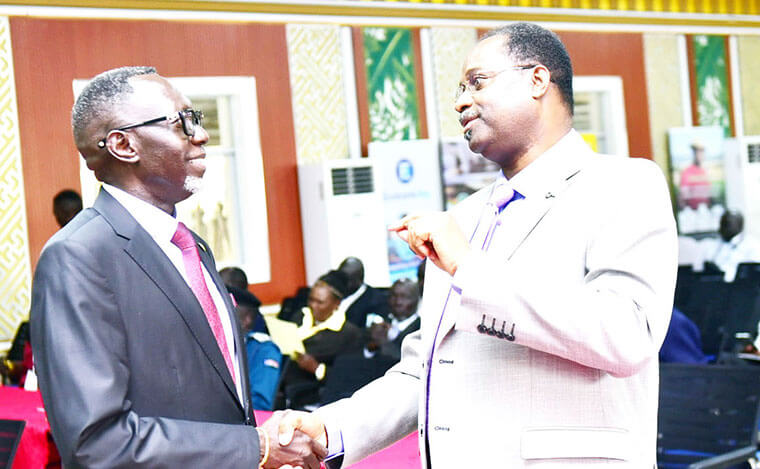
Our Projects are
Transforming African Trade
Quick Contacts
2nd Floor, Fidelity Insurance Centre Waiyaki Way, Westlands

Participants from last week’s joint business forum be- tween Uganda and South Sudan in Juba have resolved to boost trade and investment ties between the two countries through industrialization and infrastructure development, writes NICHOLAS BAMULANZEKI.
The talks were intended to identify ways to enhance investment opportunities between both countries and consequently improve the livelihood of their people. According to the Foreign Affairs ministry, the forum created enormous benefits for both countries, including employment opportunities and a larger market access for both goods and services.
South Sudan is one of Uganda’s largest trading partners. In 2021, trade between the two countries was worth $389 million, according to the 2021 Bank of Uganda report, not considering the large volumes of informal trade across the borders.
Uganda’s exports to South Sudan amounted to $482.46 million, while imports were $10.25 million, about 37.34 percent of Uganda’s exports within the East African Community. What’s more, exports from Uganda to South Sudan have increased at an annualized rate of 46 per cent, from $17.3 million in 2012 to $357 million in 2020.
The top exports include foodstuffs such as grain, sorghum, cane sugar and chemically pure sucrose in solid form. The South Sudan-Uganda Business Forum is a private sector-driven event where over 30 businesses are exhibiting products from the sectors of agriculture, agribusiness, cosmetics, arts and crafts and services such as banking, and telecommunications, among others.
It is on this background that Brig Gen Ronald Balya, the Uganda ambassador to South Sudan, noted that the agreement provides an opportunity for the two countries to freely trade amongst themselves.
“We cannot enjoy these benefits of free trade when we do not emphasize issues such as standards. I, therefore, urge our two countries to work hand in hand to ensure that standards of products from both our countries are maintained. I, therefore, call for deeper interaction between our two bureaus of standards to ensure that standards of products crossing the border are maintained,” he said.
“South Sudan and Uganda representatives are committed to providing an enabling good trade environment for their people and business to flourish. We hope that the forum will enable the private sector in Uganda and South Sudan examine achievements and challenges, but also identify opportunities that can be explored to expand their businesses.”
On his part, Simon Duku Michael, the South Sudan ambassador to Uganda, called upon business persons to be honest.
“The two countries have a strong and vibrant historical relationship which can be used as a channel to improve trade between the two countries,” he said.
Simon Akuei Deng, the secretary general of South Sudan Chamber of Commerce, expressed a need for honesty in business between the two countries.
“Our brothers and sisters from Uganda play a key role in business in Juba but we appeal to them to be honest because we depend a lot on them,” he said.
Meanwhile, Stephen Asiimwe, the Private Sector Foundation Uganda (PSFU) chief executive, emphasized the need for social economic ties between the two countries. He said Ugandan businesses are looking to discuss advocacy, and networking, explore new opportunities, showcase products and services, and seek to understand the interventions required to strengthen the trade ties between the two countries.
He added that the target sectors are trade and commerce, mining, tourism, textiles, and oil and gas. The joint business Forum was co-sponsored by Centenary Group, EcoBank, MTN South Sudan, mGURUSH and Trademark East Africa. On the other hand, Mary Gordon Muortat, the CEO of South Sudan National Bureau of Standards, noted that the biggest challenge is the large influx of expired, substandard and counterfeit goods in the country.
“I am glad this forum is exploring ways of stopping this to create goods that conform to the international standards. Most goods are coming through Uganda and this affects our economy but I hope this forum ably addresses this issue,” she said.
“We have a daily flight from Entebbe to Juba which takes just 55minutes and we believe the business between the two countries can be further harmonized when both governments commit to create an enabling environment for business,” he said.
“We need to have this as an annual forum to attract the whole of East Africa to remove non-tariff barriers.”
Read original article
Disclaimer: The views and opinions expressed in this article are those of the authors and do not necessarily reflect the official policy or position of TradeMark Africa.